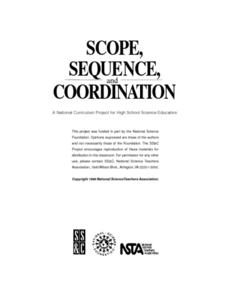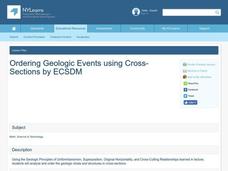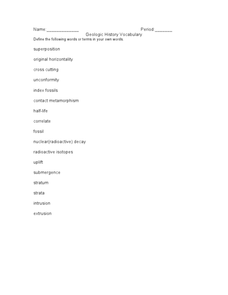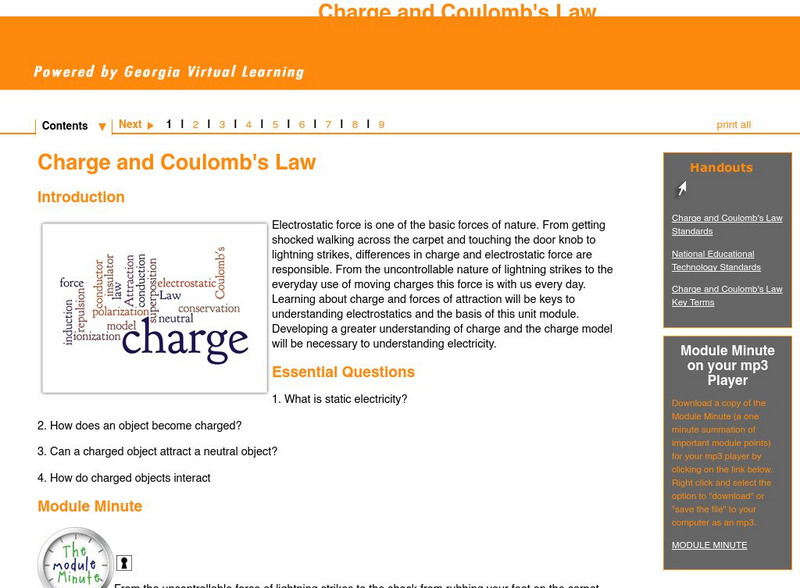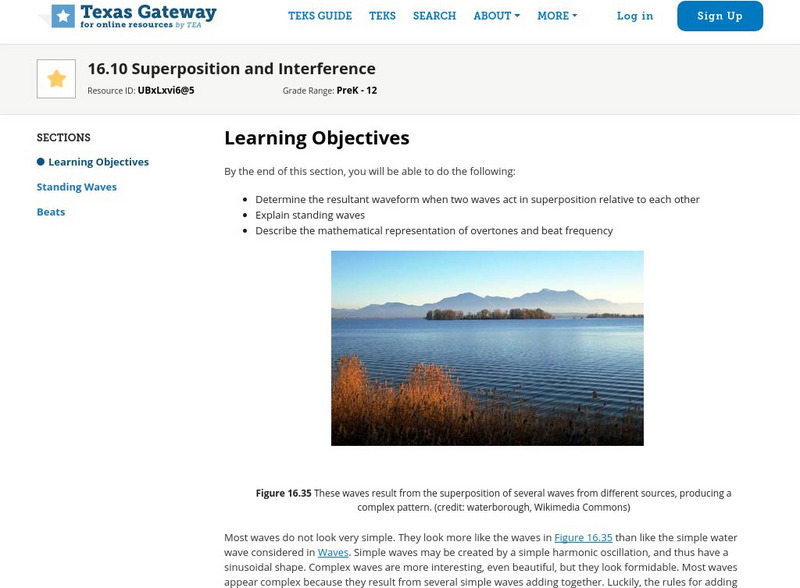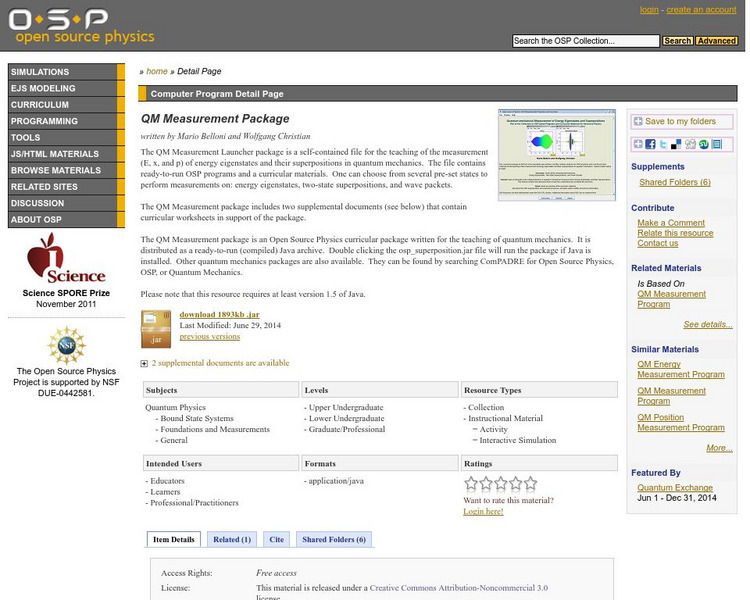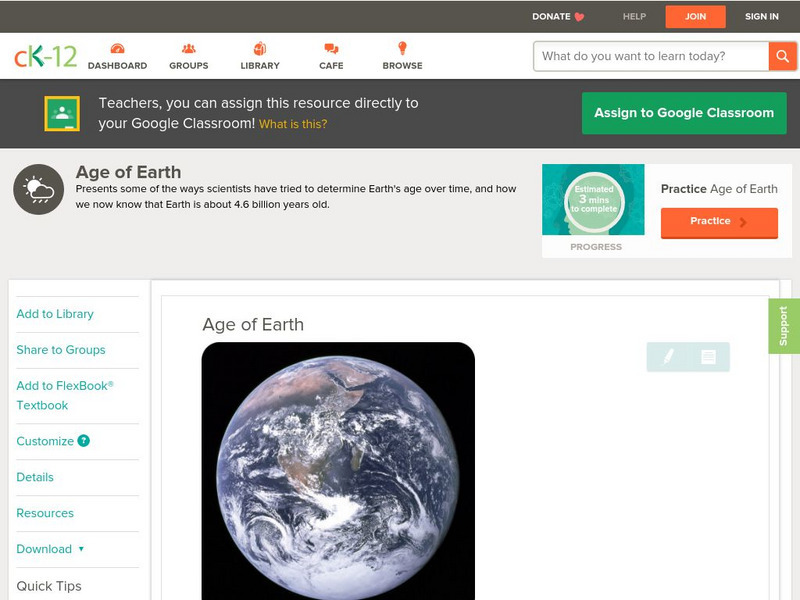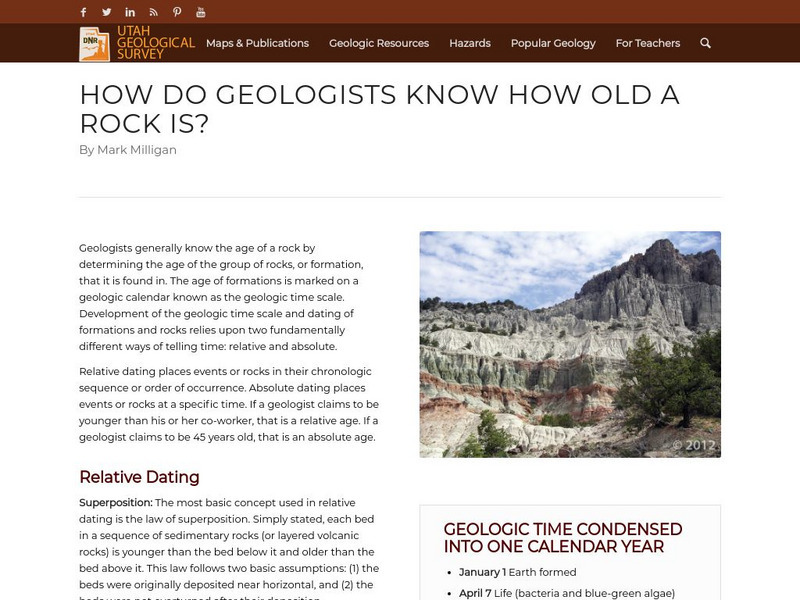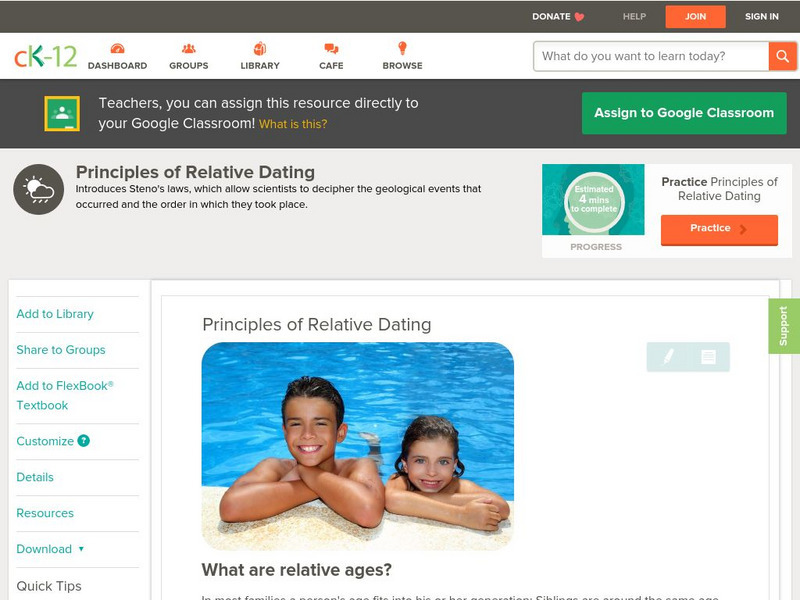Curated OER
Wave Phenomena and the Electromagnetic Spectrum
Science learners scrutinize shadow size and quality, and experiment with diffraction. They model superposition of electromagnetic waves, and experiment with interference. These activities are action-packed and challenging for your...
Curated OER
Geologic History PowerPoint Follow Sheet-The Rules of the Game
In this geologic history worksheet, students answer questions about the earth's history, about dating fossils, about layers of rocks and about unconformity.
Curated OER
Creating a Rock Sequence
In this rock sequence learning exercise, students will sequence a list of 10 historical events according to the principle of superposition. Students will label these events on a cross-section diagram.
Curated OER
Mars Geologic Mapping
Young scholars identify and interpret photographic details of a Martian surface image, design, and create a simple features map. They identify and interpret the geologic history of a part of Mars' surface and then, analyze and discuss...
Curated OER
Ordering Geologic Events Using Cross-Sections
Middle schoolers analyze cross-sections of geologic events. In this geology lesson, students identify the type of environment where the cross-section come from. They take a quiz at the end of the lesson.
Curated OER
Geological History Vocabulary
In this geological history worksheet, students define 17 terms associated with index fossils, nuclear decay, and radioactive decay.
Curated OER
Relative Ages of Rocks
For this rocks worksheet, students review how sediments are layered over time and how the relative ages of rocks are determined. This worksheet has 1 matching and 11 multiple choice questions.
Georgia Department of Education
Ga Virtual Learning: Magnetism and Current Carrying Wires
In this interactive tutorial students will explore how a magnetic field affects a current-carrying wire and also how two current-carrying wires affect each other. They will learn about Biot-Savart, Ampere's Law and the magnetic field...
TeachEngineering
Teach Engineering: Learning Light's Properties
Students learn the basic properties of light--the concepts of light absorption, transmission, reflection and refraction, as well as the behavior of light during interference. Lecture information briefly addresses the electromagnetic...
Georgia Department of Education
Ga Virtual Learning: Charge and Coulomb's Law
Learning about charge and forces of attraction will be keys to understanding electrostatics and the basis of this learning unit. Developing a greater understanding of charge and the charge model is necessary to understanding electricity.
Texas Education Agency
Texas Gateway: Superposition and Interference
By the end of this section, you will be able to determine the resultant waveform when two waves act in superposition relative to each other, explain standing waves, and describe the mathematical representation of overtones and beat...
Other
Milton J. Rubenstein Museum: Determining the Age of Rocks and Fossils [Pdf]
This set of activities from the Milton J. Rubenstein Museum of Science & Technology has students investigating how relative dating and absolute dating methods are used to determine the age of rocks and fossils.
CK-12 Foundation
Ck 12: Wave Properties
[Free Registration/Login may be required to access all resource tools.] Students investigate behaviors of waves, including interference, reflection, refraction, and diffraction.
Science Education Resource Center at Carleton College
Serc: Quantum Physics: An Introduction
Interactive demonstration provides students with an introduction to Quantum Physics. They will also be introduced to wave/particle duality, Heisenburg Uncertainty Principle, superposition, Schrodinger's cat, and wavefunction.
Science Education Resource Center at Carleton College
Serc: Investigating Rock Layers and Fossils to Infer Past
This activity is an inquiry-based field investigation of the sedimentary geology of Lilydale Regional Park's brickyards area, a bluff and slope location near St. Paul Minnesota's Harriet Island and Cherokee Heights Park. Students...
Science Education Resource Center at Carleton College
Serc: Mn Step: Relative Dating Using "The Block"
This lesson involves an innovative strategy for introducing the concept of relative dating using a block of wood that has been painted, damaged, and nailed. The task for students is to analyze the order in which these events happened and...
American Association of Physics Teachers
Com Padre Digital Library: Open Source Physics: Qm Measurement Package
Learn how to make measurement of energy eigenstates and their superpositions in quantum mechanics. Tutorial and exercises are included.
CK-12 Foundation
Ck 12: Earth Science: Age of Earth
[Free Registration/Login may be required to access all resource tools.] How scientists have been able to determine the age of the Earth.
CK-12 Foundation
Ck 12: Earth Science: Age of Earth
[Free Registration/Login may be required to access all resource tools.] How scientists have been able to determine the age of Earth.
Other
S Cool Youth: Diffraction, Interference and Superposition
An interactive resource on diffraction, interference and superposition with descriptions, animations, and questions.
Physics Classroom
The Physics Classroom: Waves: Behavior of Waves: Interference of Waves
Students discover wave interference, the phenomenon that occurs when two waves meet while traveling along the same medium.
Texas Education Agency
Texas Gateway: Oscillatory Motion and Waves: Glossary
This is a glossary of terms and definitions used in Chapter 16: Oscillatory Motion and Waves from the AP Physics online text.
Other
Utah Geological Survey: How Do Geologists Know How Old a Rock Is?
Geologists generally know the age of a rock by determining the age of the group of rocks, or formation, that it is found in. The age of formations is marked on a geologic calendar known as the geologic time scale. Development of the...
CK-12 Foundation
Ck 12: Earth Science: Principles of Relative Dating
[Free Registration/Login may be required to access all resource tools.] Introduces Steno's laws, which allow scientists to decipher the geological events that occurred and the order in which they took place, including how the relative...


